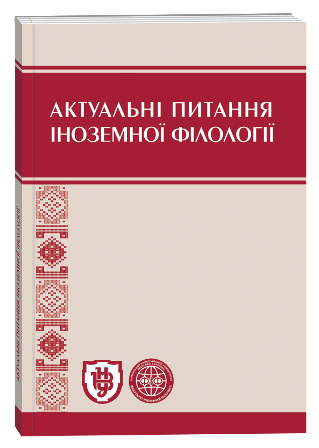ENGLISH NEOLOGISMS IN MODERN ECONOMIC DISCOURSE
DOI:
https://doi.org/10.32782/2410-0927-2022-16-4Keywords:
economic discourse, neologisms, word formation, semantics, word compositionAbstract
The paper deals with analysing the English-language economic discourse, as it is one of the most productive sources of replenishment of the lexical system of the language. The notion of “neologism” and its stages during its existence are examined. The significance of the study is that continuous progress and various changes in the economy of different countries lead to the emergence of neologisms, which requires a detailed study of their structural and semantic features. The selected neologisms were used for lexical and semantic analysis to identify current trends of neologisms within the economic discourse. The thematic classification of the new vocabulary has enabled to reveal the following categories as: neologisms that name the types of economy/ economic systems, new economic phenomena, money expenditure, trade activities, new types of business fraud, new professions and categories of people, terms related to technology, new concepts in the labour market in the field of economics. The examined material indicates the dominance of neologisms in the following areas of this discourse: economic phenomena, professions and categories of people, new concepts in the labour market. Analysing economic discourse, the following methods of word formation of neologisms were identified: compounding, affixation, telescoping, reinterpretation, borrowing and abbreviation. The most productive methods of word formation in the economic discourse are compounding and telescoping. Telescoping has recently become an active method of the new economic vocabulary enrichment. Less productive methods of neologization are affixation, abbreviation, borrowing, and reinterpretation. It has also been found that economic discourse appeals to a wide audience, constantly adapting to it, balancing between “terminological accuracy” and clarity. This characteristic of economic discourse affects the way information is presented.
References
Архипенко Л. М. Термінологічна лексика в економічному дискурсі (на матеріалі інтернет-видання «Економічна правда»). Вчені записки ТНУ імені В. І. Вернадського. Серія: Філологія. Соціальні комунікації. 2020. Том 31. № 2. Ч. 1. С. 112–118. http://philol.vernadskyjournals.in.ua/journals/2020/2_2020/part_1/22.pdf
Волкова С. Г. Неологізми та особливості їх утворення на прикладі лексичного матеріалу в медіа ресурсах. Модернізація та наукові дослідження: парадигма інноваційного розвитку суспільства і технологій : матеріали ІІ Міжнародної наук.-практ. конф., м. Київ, 25–26 січ. 2019 р. Київ, 2019. С. 71–73. URL: https://novaosvita.com/wp-content/uploads/2019/03/ModScResParadigm-Kyiv-Jan2019.pdf
Громовенко В. В. Словотворення політичних неологізмів в українській та англійській мовах: зіставний аспект : автореф. дис. … д-ра філософії: 035 «Філологія» 03 «Гуманітарні науки». Вінниця, 2021. 204 с. URL: https://abstracts.donnu.edu.ua/article/view/9473/9405
Гурко О. В. Неологізми та їхня експлікація в англійському мовленні. Збірник наукових праць «Нова філологія». 2021. № 82 С. 49–53. http://novafilolohiia.zp.ua/index.php/new-philology/article/view/558
Калінюк О. О. Особливості функціонування неологізмів у тексті кіносценарного комунікативного трансформу. Сучасні студії з романської і германської філології : матеріали міжнар. наук.-практич. конф., м. Одеса, 15 трав. 2020 р. Одеса, 2020. С. 56–59.
Капустіна О. В., Сініцина Н. М. Деякі аспекти перекладу неологізмів у сучасному економічному дискурсі. Стратегії міжкультурної комунікації в мовній освіті сучасного ВНЗ : зб. матеріалів міжнар. наук.-практ. конф., м. Київ, 15 березня 2018 р. Київ, 2018. С. 218–221. URL: http://ir.kneu.edu.ua/bitstream/handle/2010/25078/zb_2018.pdf;jsessionid=06A91B1FCD9BC03C84652F196D84AC1E?sequence=1
Козубай І. В., Хаджи А. Ю. Дослідження структурно-семантичних особливостей новоутворень сучасної англійської мови. Вісник Луганського національного університету імені Тараса Шевченка: Філологічні науки. 2020. № 3 (334). С. 19–26. http://visnyk.luguniv.edu.ua/index.php/vphil/article/view/282
Лут К. А. Демаркація понять «економічний» та «діловий дискурс». Наукові записки. Серія «Філологічна». 2011. № 20. C. 130–137. http://irbis-nbuv.gov.ua/cgi-bin/irbis_nbuv/cgiirbis_64.exe?C21COM=2&I21DBN=UJRN&P21DBN=UJRN&IMAGE_FILE_DOWNLOAD=1&Image_file_name=PDF/Nznuoaf_2011_20_20.pdf
Остафійчук О. Д. Неологізми англійської мови в сучасному суспільстві. Вчені записки ТНУ імені В. І. Вернадського. Серія: Філологія. Соціальні комунікації. 2020. Том 31. № 3. Ч. 1. С. 156–160. http://philol.vernadskyjournals.in.ua/journals/2020/3_2020/part_1/30.pdf
Cambridge Dictionary. About words. URL: https://dictionaryblog.cambridge.org
Savelyuk N., Kalmykov O., Riznyk V. Psychosemantic Dimensions of Basic Concepts of Economic Discourse (Comparative and Professional Aspect). Psycholinguistics. 2021. № 29 (1). P. 142–166. https://psycholing-journal.com/index.php/journal/article/view/1171







